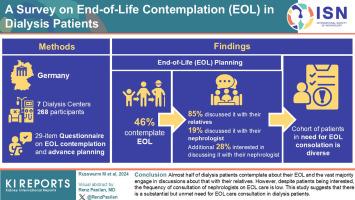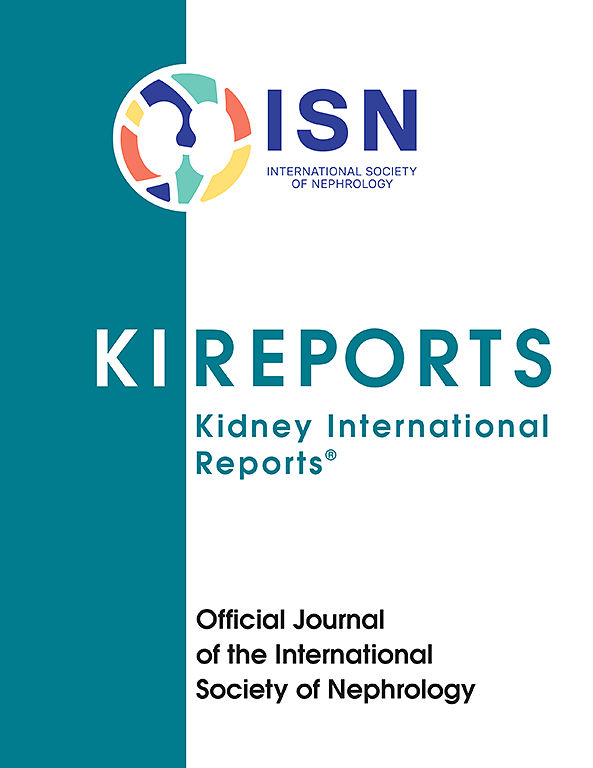A Survey on End-of-Life Contemplation Among Patients on Dialysis
IF 5.7
2区 医学
Q1 UROLOGY & NEPHROLOGY
引用次数: 0
Abstract
Introduction
Considering that mortality among patients on dialysis is high, it would be advisable for patients, relatives, and care givers to acknowledge that after dialysis initiation for many patients, the last phase in life has begun. We sought to investigate the frequency of precautionary planning directives, contemplation about the end-of-life (EOL) and embedding of patients’ wishes in the interaction with relatives and the treating nephrologists.
Methods
In a questionnaire-based interview survey, we investigated the frequency of precautionary planning, EOL wishes, and frequency of relatives’ or medical professionals’ conversations with patients about those wishes as well as possibly associated demographic, socioeconomic and medical factors. The interviews were conducted by a single investigator in 7 dialysis centers in Germany.
Results
From 349 identified patients, 268 (77%) participated. The participants (36% female) had a median age of 70 (interquartile range [IQR]: 58–80) years and had spent a median of 3 (IQR: 1–7.5) years on dialysis. Overall, 46% of patients on dialysis contemplated their EOL wishes at least occasionally. Of those, 85% talked about EOL wishes with their relatives, whereas 19% discussed them with their nephrologists, yet another 28% would like to have such a discussion with their nephrologist.
Conclusion
Almost half of patients on dialysis contemplate their EOL and the vast majority engage in discussions about that with their relatives. Despite patients being interested, the frequency of consultation of nephrologists on EOL care is low. This study suggests that there is a substantial but unmet need for EOL care consultation for patients on dialysis.

透析患者对生命终结的思考调查
考虑到透析患者的死亡率很高,患者、亲属和护理人员最好能认识到,许多患者在开始透析后,生命的最后阶段已经开始。我们试图调查在与亲属和主治肾科医生的互动中,患者是否经常使用预防性计划指令、思考生命末期(EOL)以及将患者的意愿融入其中。在一项基于问卷的访谈调查中,我们调查了预防性规划的频率、临终前的愿望、亲属或医务人员与患者就这些愿望进行交谈的频率以及可能相关的人口、社会经济和医疗因素。访谈由一名调查人员在德国的 7 个透析中心进行。在 349 名确定的患者中,有 268 人(77%)参加了访谈。参与者(36% 为女性)的年龄中位数为 70 岁(四分位距[IQR]:58-80),透析时间中位数为 3 年(四分位距:1-7.5)。总体而言,46% 的透析患者至少偶尔会考虑自己的临终愿望。其中 85% 的患者会与亲属讨论临终前的愿望,19% 的患者会与肾科医生讨论临终前的愿望,还有 28% 的患者希望与肾科医生讨论临终前的愿望。几乎一半的透析患者都考虑过自己的生命终结问题,而且绝大多数患者都与亲属讨论过这一问题。尽管患者对此很感兴趣,但肾科医生就临终关怀进行咨询的频率却很低。这项研究表明,透析患者对临终关怀咨询的需求很大,但尚未得到满足。
本文章由计算机程序翻译,如有差异,请以英文原文为准。
求助全文
约1分钟内获得全文
求助全文
来源期刊

Kidney International Reports
Medicine-Nephrology
CiteScore
7.70
自引率
3.30%
发文量
1578
审稿时长
8 weeks
期刊介绍:
Kidney International Reports, an official journal of the International Society of Nephrology, is a peer-reviewed, open access journal devoted to the publication of leading research and developments related to kidney disease. With the primary aim of contributing to improved care of patients with kidney disease, the journal will publish original clinical and select translational articles and educational content related to the pathogenesis, evaluation and management of acute and chronic kidney disease, end stage renal disease (including transplantation), acid-base, fluid and electrolyte disturbances and hypertension. Of particular interest are submissions related to clinical trials, epidemiology, systematic reviews (including meta-analyses) and outcomes research. The journal will also provide a platform for wider dissemination of national and regional guidelines as well as consensus meeting reports.
 求助内容:
求助内容: 应助结果提醒方式:
应助结果提醒方式:


